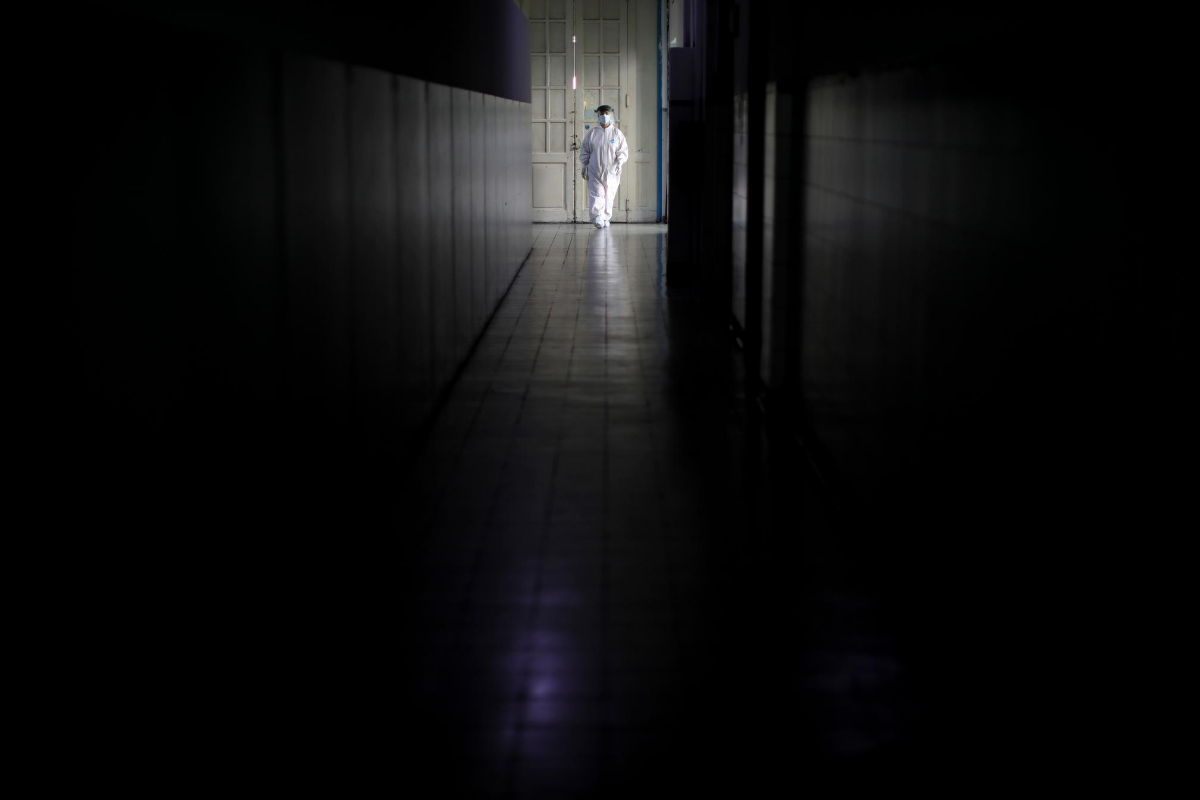

Andrea Cortes walks in the hallway of the Hospital Pineiro where she works as a nurse in Buenos Aires, Argentina, Friday, July 17, 2020. (AP Photo/Natacha Pisarenko)
By DEBORA REY, Associated Press
BUENOS AIRES, Argentina (AP) — Even before the new coronavirus hit, Argentina’s health care workers were struggling, most of them often working more than 12 hours a day at multiple jobs to make ends meet amid the country’s overheated inflation.
The pandemic has meant even tougher times on the job, providing medical care for the gravely ill and also giving what comfort they can to patients dying of COVID-19 while cut off by quarantine from saying goodbye to family and friends.
Some still go home at night to their families, after taking precautions. Others, fearing for loved ones, have moved into hotels. Some have sent their children to stay with relatives.
Dr. Matías Norte, a surgeon who specializes in cancer cases but is also helping treat COVID-19 cases at the three hospitals where he works, sometimes has to drive an hour to get home to the apartment he shares with his wife, Silvina Cáceres Monié, in the capital. A kiss and embrace must wait until he showers.
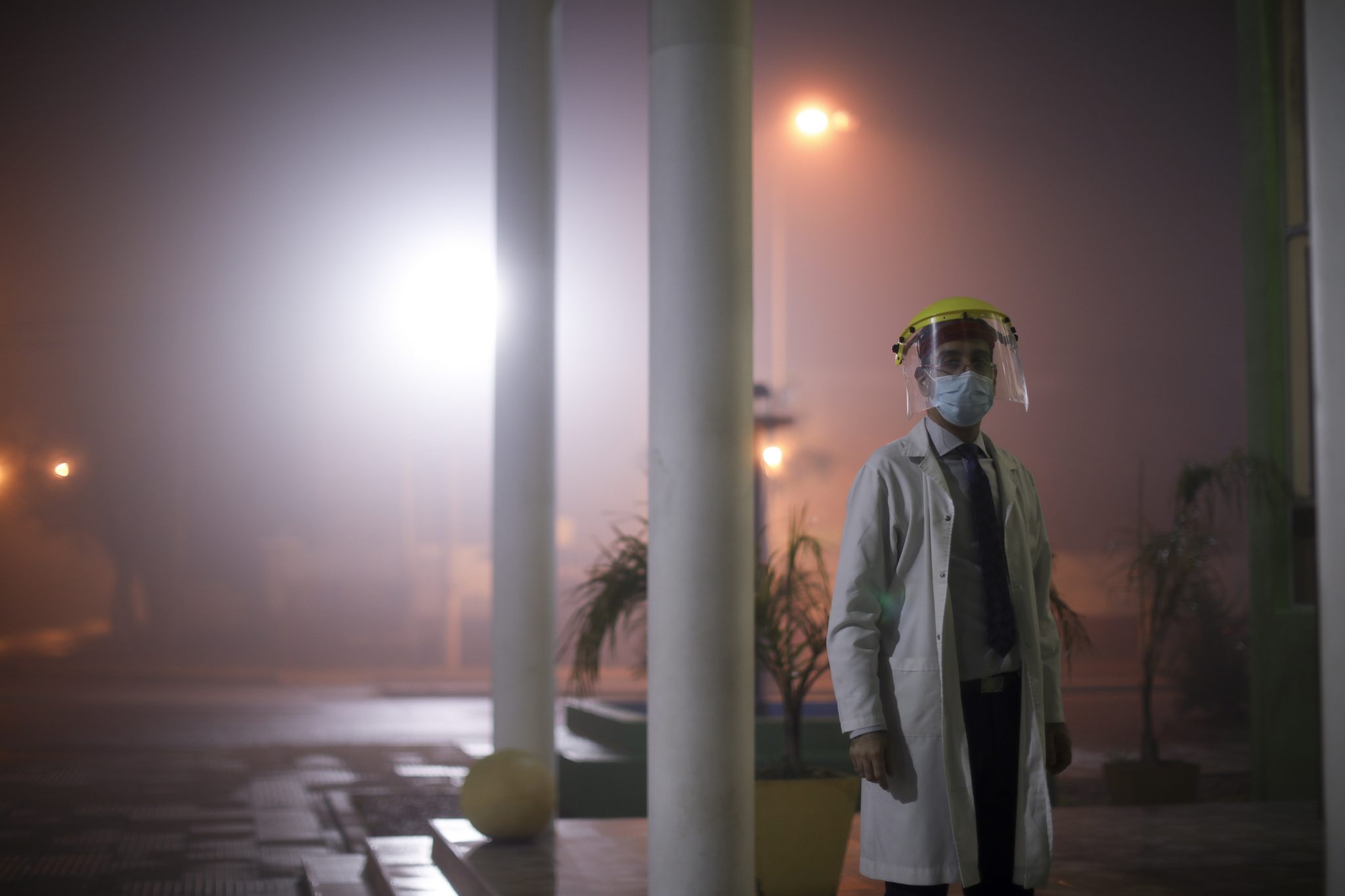

Dr. Matias Norte stands outside a hospital during a government-ordered lockdown to curb the spread of the new coronavirus in Buenos Aires, Argentina, Saturday, July 18, 2020. (AP Photo/Natacha Pisarenko)
“When I come in, it’s such a great joy that you forget everything. You’re happy to get home,” Norte says.
Andrea Cortes, a nurse, also goes home to be with her partner, Ariel, but they have not kissed or embraced in nearly four months. She hasn’t seen her 27-year-old daughter for nearly that long.
Cortes, who puts in an average of 17 hours a day at two hospitals in Buenos Aires, worries constantly about bringing the virus home.
“That fear and doubt make me hold this distance with the family until it’s all over because I love them and I have to take care of them,” she says.
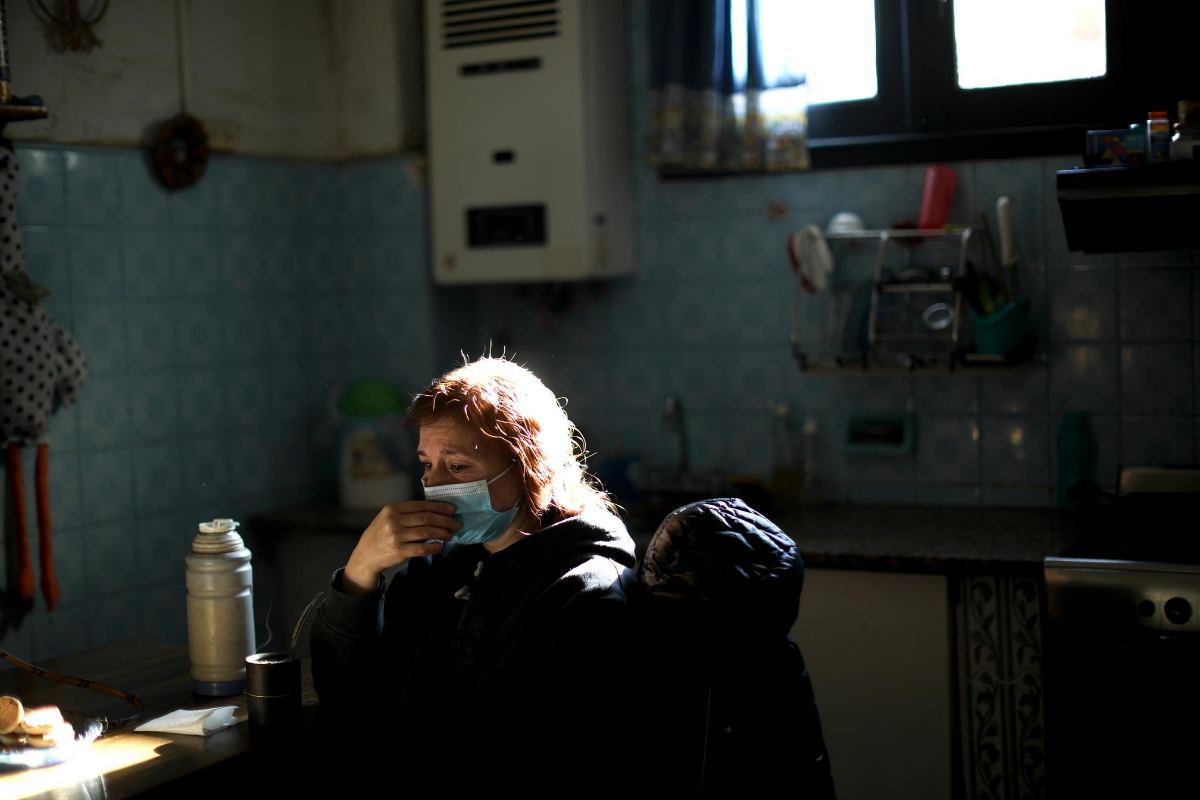

Andrea Cortes sits in her kitchen during a government-ordered lockdown to curb the spread of the new coronavirus in Buenos Aires, Argentina, Monday, July 13, 2020. (AP Photo/Natacha Pisarenko)
Doctors, nurses and other health workers account for 7% of the more than 130,000 confirmed infections reported by Argentina’s government.
Juan José Comas tested positive for the coronavirus but never showed any symptoms while he was quarantined at the hospital where he began working as a volunteer when the pandemic began. He got his medical degree last year but still must do training before taking his resident’s examination, for which he has now gotten a crash course in treating patients.
Comas has been sharing a hotel room with three doctors he didn’t know since moving out of his parent’s home in April to protect them. “I went a couple of times to see them behind the gate,” he says.
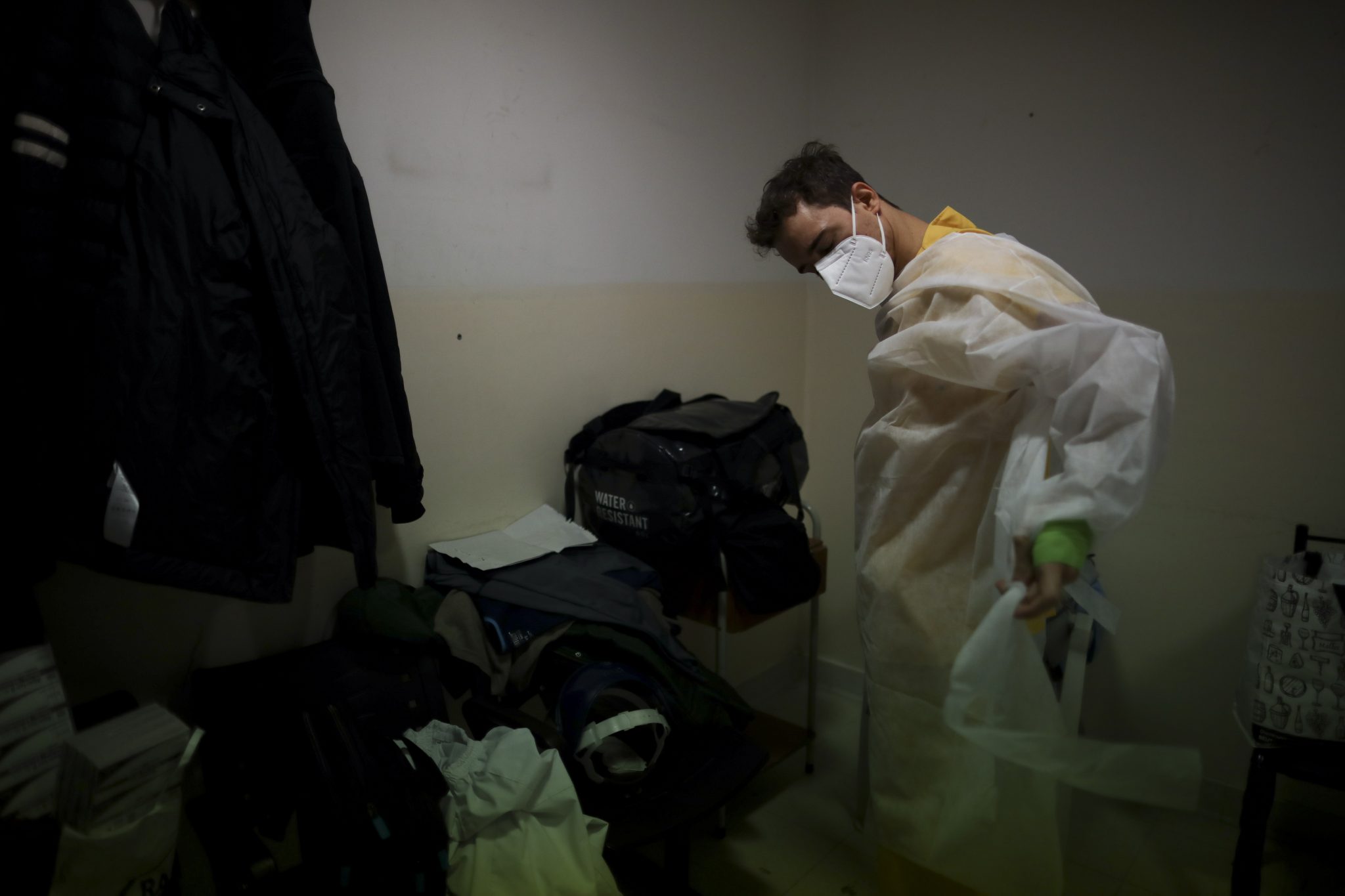

Dr. Juan Jose Comas dresses in full protective gear as he prepares to see a patient infected with COVID-19, at the Ezeiza Hospital, southwest of Buenos Aires, Argentina, Thursday, July 16, 2020. (AP Photo/Natacha Pisarenko)
It has been three months since nurse Marcela Brancati last saw her 9-year-old daughter, Agostina. She only gets to watch her daughter through photos sent on WhatsApp by her mother, who is caring for the girl.
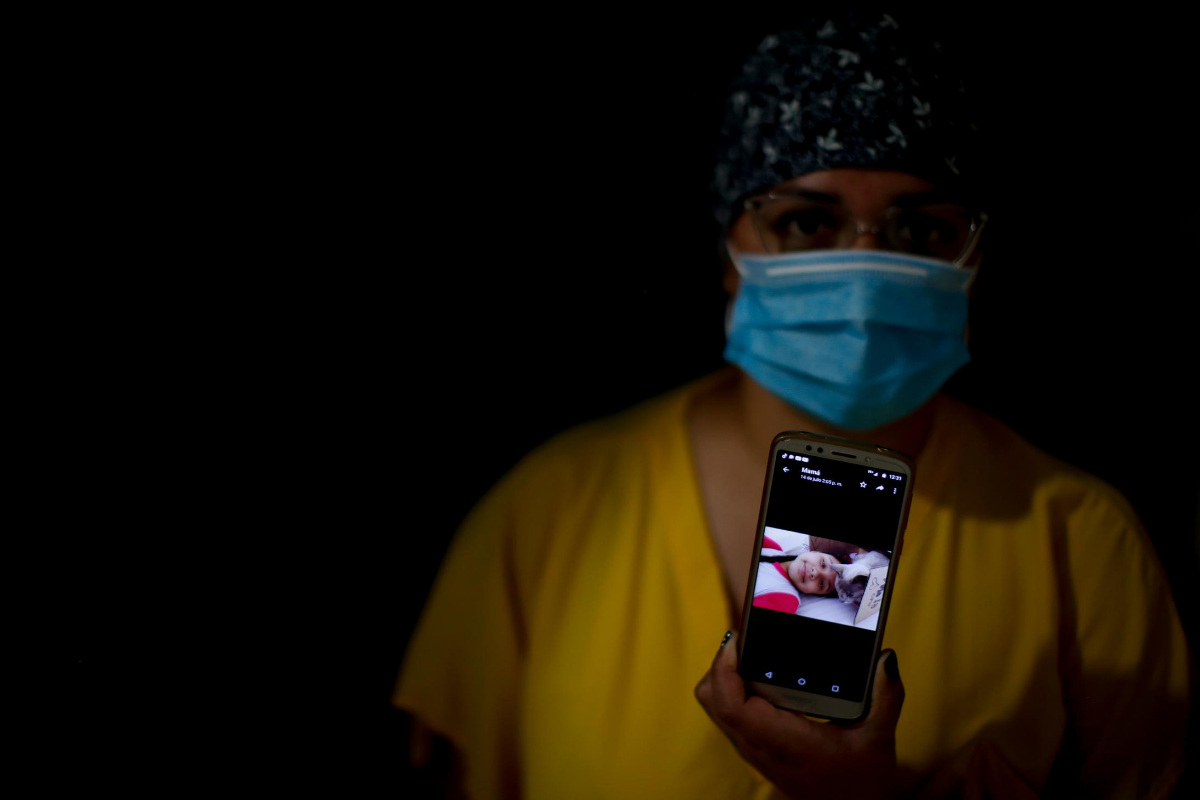

Marcela Brancati, a nurse, shows a picture of her 9-year old daughter Agostina, during her shift at the Ezeiza Hospital, southwest of Buenos Aires, Argentina, Thursday, July 16, 2020, amid the new coronavirus pandemic.(AP Photo/Natacha Pisarenko)
“We’ve never been apart so long. It’s very difficult,” Brancati says. “Sometimes she calls me crying. She can’t stand it and she wants to go back (home).”
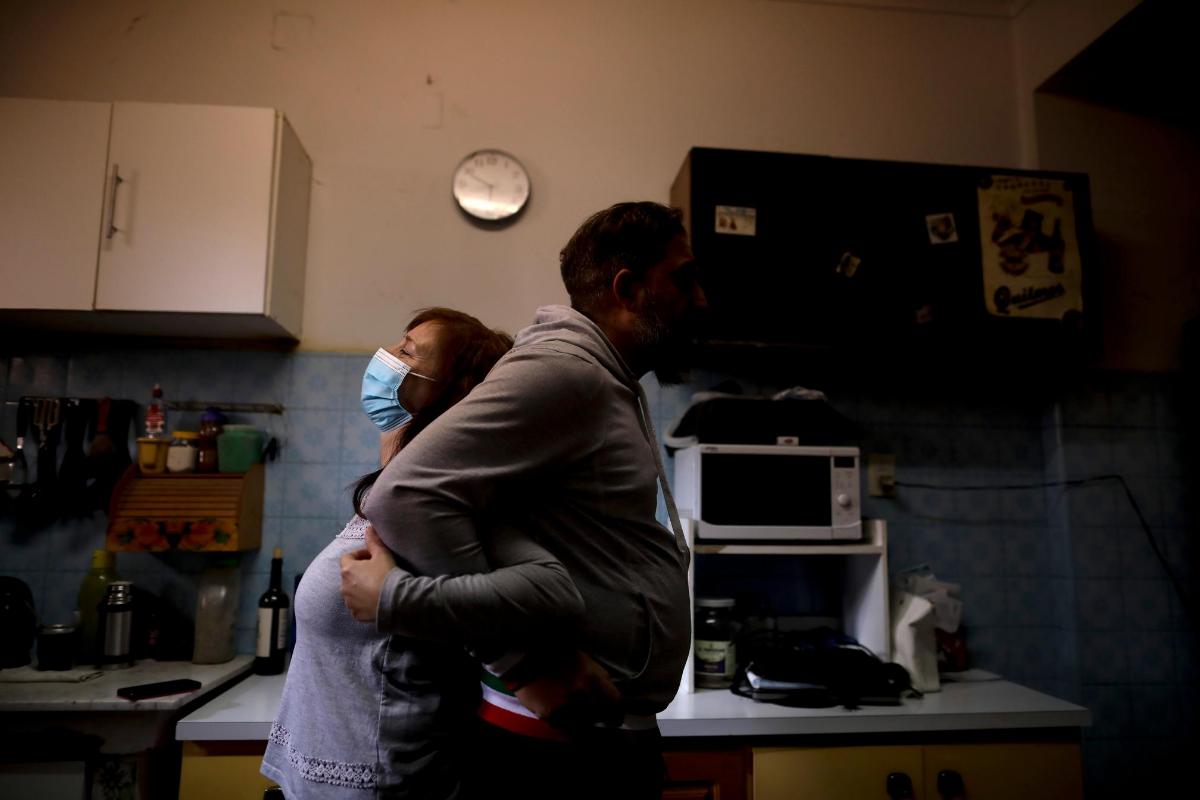

Andrea Cortes demonstrates how she embraces her husband amid the new coronavirus pandemic, while standing in their kitchen in Buenos Aires, Argentina, Monday, July 13, 2020. (AP Photo/Natacha Pisarenko)


Andrea Cortes, a 49-year-old nurse, rests in her home in Buenos Aires, Argentina, Monday, July 13, 2020, during a government-ordered lockdown to curb the spread of the new coronavirus. Cortes, who decided to study nursing after her brother died in an accident, works an average of 17 hours a day. (AP Photo/Natacha Pisarenko)


Dr. Juan Jose Comas visits a patient infected with COVID-19 at the Ezeiza Hospital, southwest of Buenos Aires, Argentina, Thursday, July 16, 2020. The pandemic has meant even tougher times on the job, providing medical care for the gravely ill and also giving what comfort they can to patients dying of the new coronavirus who are cutoff by quarantine unable to say goodbye to family and friends. (AP Photo/Natacha Pisarenko)


Gabriela Sian, a nurse, washes her face before going on her lunch break at the Hospital Britanico, in Buenos Aires, Argentina, Wednesday, July 22, 2020. Sian works in an area exclusively for COVID-19 patients which initially made her feel afraid and uncertain but since has adapted. (AP Photo/Natacha Pisarenko)


Dr. Juan Jose Comas sits looking out a window in a corridor of a hotel where he is sharing a room with three other doctors, in Buenos Aires, Argentina, Thursday, July 16, 2020, amid the new coronavirus pandemic. “My life goes from the hotel to the hospital. Even if you get along very well, you need your space. I go in front of the window to read or I go for a walk. Do not leave here, it burns you,” he admits. (AP Photo/Natacha Pisarenko)


Gabriela Sian, a nurse, checks in on patients infected with COVID-19 via telephone at the Hospital Britanico, in Buenos Aires, Argentina, Wednesday, July 22, 2020. Sian says she is struck by the admiration she receives from people who are not healthcare workers and says that she feels proud of the role she is playing in the pandemic. (AP Photo/Natacha Pisarenko)


Dr. Matias Norte comforts a patient infected with COVID-19 at a hospital in Buenos Aires, Argentina, Saturday, July 18, 2020. The dilemma between empathy with patients and the fear of becoming infected accompanies Norte at the end of every workday on his hour drive home to the apartment he shares with his wife. (AP Photo/Natacha Pisarenko)


Marcela Brancati, a nurse, attends to a patient infected with COVID-19 at the Ezeiza Hospital, southwest of Buenos Aires, Argentina, Thursday, July 16, 2020. “I like to be with patients, chat, attend to them. Patients want to see your face, it is difficult not to be able to show your face, hug them or give them a pat. It costs me a lot,” says Brancati. (AP Photo/Natacha Pisarenko)


Dr. Matias Norte embraces his wife Silvina in a hallway of their apartment in Buenos Aires, Argentina, Saturday, July 18, 2020, after a long day of treating COVID-19 patients but no kissing or hugging until after he has showered as a precaution due to the pandemic. “When I come in, it’s such a great joy that you forget everything. You’re happy to get home,” says Norte, a surgeon who specializes in cancer cases but is also helping treat new coronavirus cases at the three hospitals where he works. (AP Photo/Natacha Pisarenko)


